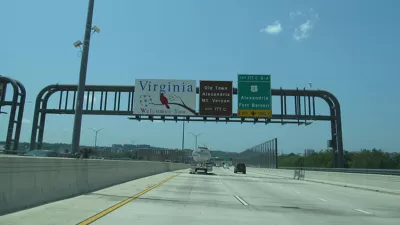States are increasingly looking to high occupancy toll lanes as a means of revenue generation as well as congestion management, as they deal with the shortfall in transportation revenue from federal and state governments. Ga. may provide a good test.
"States from California to Virginia see the lanes, often set up in partnership with private companies, as a crucial way of generating new revenue in an era of constrained budgets—even though some haven't generated the dollars they were projected to bring in. Road planners like the idea of adjusting prices to manage traffic, and they think drivers prefer the option of paying to get there faster over traditional tolls." writes Cameron McWhirter.
With HOT lanes or "Express Lanes", as transportation planners, including the Georgia Department of Transportation (GDOT) like to call them because of the speed advantage paying users enjoy, the adjacent lanes remain free or "unmanaged" and can experience congestion, especially during peak hours.
A good comparison with the revenue brought in from traditional tolls, where all lanes are tolled, will soon be available thanks to Republican Gov. Nathan Deal's promise to voters to eliminate tolls on Georgia 400. The toll plaza was shut down on November 22.
As part of an $840 million project called the Northwest Corridor [GDOT press release, PDF], "the most expensive in the state's history," HOT lanes will be installed "along 30 miles of interstates 75 and 575 in Cobb and Cherokee counties", according to the Atlanta Business Chronicle. Now Georgia "hopes some of the revenue will replace the roughly $20 million a year it used to generate from Georgia 400," writes McWhirter.
This will not be Georgia's first foray into HOT lanes. On October 10, 2011, we posted "Atlanta's New I-85 Express Lanes Off To Rough Start." Virginia appears to have experienced the same slow start with the 495 Express Lanes in northern Virginia in February, also described in October.
Yet the Virginia Department of Transportation is not deterred. In consortium with Australia-based Transurban Group Ltd, "plans to open more HOT lanes on a portion of nearby I-95.
FULL STORY: On U.S. Highways, More Fast Lanes Aren't Free

Alabama: Trump Terminates Settlements for Black Communities Harmed By Raw Sewage
Trump deemed the landmark civil rights agreement “illegal DEI and environmental justice policy.”

Study: Maui’s Plan to Convert Vacation Rentals to Long-Term Housing Could Cause Nearly $1 Billion Economic Loss
The plan would reduce visitor accommodation by 25% resulting in 1,900 jobs lost.

Planetizen Federal Action Tracker
A weekly monitor of how Trump’s orders and actions are impacting planners and planning in America.

This Toronto Suburb Has More Bus Riders Than Columbus, Ohio
Brampton, Ontario used gradual improvements in service to prove that if you build it, they will ride.

Paris Bike Boom Leads to Steep Drop in Air Pollution
The French city’s air quality has improved dramatically in the past 20 years, coinciding with a growth in cycling.

Why Housing Costs More to Build in California Than in Texas
Hard costs like labor and materials combined with ‘soft’ costs such as permitting make building in the San Francisco Bay Area almost three times as costly as in Texas cities.
Urban Design for Planners 1: Software Tools
This six-course series explores essential urban design concepts using open source software and equips planners with the tools they need to participate fully in the urban design process.
Planning for Universal Design
Learn the tools for implementing Universal Design in planning regulations.
Smith Gee Studio
Alamo Area Metropolitan Planning Organization
City of Santa Clarita
Institute for Housing and Urban Development Studies (IHS)
City of Grandview
Harvard GSD Executive Education
Toledo-Lucas County Plan Commissions
Salt Lake City
NYU Wagner Graduate School of Public Service




























